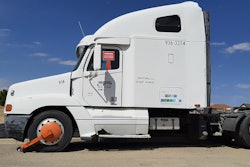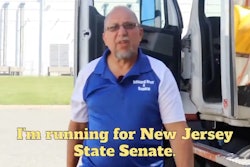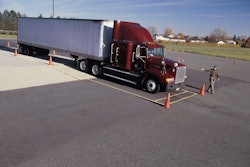A week after ramming through a stopgap measure that extended highway funding past Thanksgiving, the House of Representatives Friday night passed a $1.2 trillion infrastructure bill that provides $110 billion for roads, highways and bridges, along with money for the buildout of an electric vehicle infrastructure, water projects, the expansion of high-speed internet service, environmental cleanup and public transit. It also creates a training and apprenticeship program for under-21 commercial drivers to haul interstate.
The measure passed narrowly (228-206) with 215 Democrats voting alongside 13 Republicans in favor of a 38% increase in road and bridge funding, along with what Jim Edwards, government-affairs lead for the National Association of Small Trucking Companies, called a “mixed bag” when it comes to potential impact for small carriers.
It “spends a good amount of money on infrastructure,” he said, lauding the billions devoted to roads and bridges, though “that is about 12% of the total spending.” Highways monies is “the most dire need from our perspective,” Edwards added.
Among measures Edwards disliked were moves in the package toward tests of the idea of a vehicle-miles-traveled tax as an alternative to the fuels tax to fund highways.

[Related: Inside the debate over VMT, or a miles tax, to fund roads]
The Truckload Carriers Association (TCA) applauded the bill's passage, saying it "represents a significant investment in our nation’s roads and bridges and delivers a desperately needed injection into the Highway Trust Fund to keep it solvent. We are excited that this language provides an opportunity to expose a younger demographic to an industry that welcomes them..."
The American Trucking Associations and TCA have each been long-term supporters of legislation that would allow drivers under the age of 21 to drive interstate – removing the intrastate-only restriction – and see the outreach as one solution to fixing a perceived driver shortage that, according to ATA, has reached 80,000.
Notably absent from the bill was any language regarding the union-friendly PRO Act, which most trucking associations had long opposed as a threat to the traditional independent contractor/owner-operator leasing business models. Also missing, however, was any funding dedicated to expanding truck parking capacity.
“Congress missed opportunities to improve trucking by failing to address the parking shortage as well as detention, which would have helped with supply chain challenges,” the Owner-Operator Independent Drivers Association said in a statement to Overdrive.
NATSO, the trade association representing truck stops and travel plazas, noted that grant programs established by the Infrastructure Investment and Jobs Act encourage investments in a range of alternative fuels, including electricity, hydrogen, biofuels and natural gas, "by allowing for the benefits of innovation and technology development, which will give consumers options, all while competing for their business on price, speed, and quality of service."
NATSO President and CEO Lisa Mullings further applauded that the legislation was absent provisions that would have allowed states to compete with the private sector by installing electric vehicle charging stations at rest areas and that locations for alternative fueling must take into account the availability of amenities such as food and restrooms.
"We appreciate that Congress has ensured critical funding for America’s highways without tolling interstate highways or commercializing rest areas," she said, "which would have discouraged the private sector from investing in electric vehicle charging and other emerging technologies.”
[Related: Battery-electric truck demonstration earns award]
As part of a deal to advance the infrastructure bill, House progressives agreed to a vote to advance the Build Back Better reconciliation measure to the House floor next week. On that "social spending" legislation, as some have called it, NASTC's Jim Edwards noted the association had in fact opposed the tax-and-spend aspects of that bill as just too much, worried that impacts could fall heavily on small business.
At once, he was heartened as of Friday, Nov. 5, that particular tax schemes targeting privately held businesses like those of small trucking operators, which had been in prior iterations, did not appear to be included in most recently seen versions of the budget legislation.
“We’ve let Congress know the price that’s being demanded to get the reconciliation … is too high,” Edwards said, in terms of both “the dollar number and the contents. We’ve warned them they’re playing with a hidden tax in inflation – what they’re doing is going to continue to exacerbate inflation and heavily tax small and independent businesses, as well as the big companies” most often called out in rhetoric for not paying a fair share.









